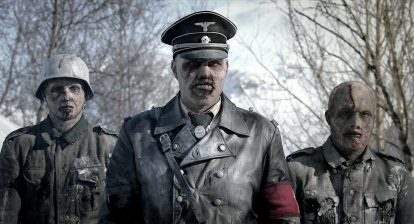When you think about zombie movies, what’s the first thing that comes to mind? For most people, it’s probably blood, guts, or scary fun, and for good reason. Those are often the main draws of the subgenre, but they’re not the only things zombie films have going for them. Many also inject their horrific fun with surprisingly deep messages, and The Girl with All the Gifts, a British movie from 2016, is one of the best in this hallowed tradition.
Like most films in this subgenre, this one is about a zombie apocalypse, but it puts a few unique touches on that well-worn trope. For one, the zombie disease in this world is caused by a fungus, not a virus. Secondly, and more importantly, pregnant women who become infected pass along the infection to their unborn children, and those children turn into something very different from traditional zombies. For the most part, they look, talk, and act like normal human beings, but they have a few dangerous zombie tendencies they sometimes struggle to control.
And that’s where the film’s surprising message comes in. Some people in this story think the human-zombie hybrids are genuinely human, but others disagree. Instead, they think these hybrids are just animals, so we can exploit them for our own needs with no concern for their well-being. The entire movie is essentially an exploration of this one question, and by the time the credits roll, we get an answer that has profound implications for our own world as well.
Setting Up a Mystery
The Girl with All the Gifts starts in a government facility where a bunch of children live and go to school, and they’re treated very harshly by just about everybody there. Most noticeably, they’re not allowed to go to and from class on their own. Instead, they’re strapped securely into wheelchairs and rolled wherever they need to go by soldiers who point guns at them while looking terrified. On top of that, one of the kids, a girl named Melanie, is particularly nice to the soldiers, but the soldiers don’t return the courtesy. For the most part, they completely ignore anything she says, and in one scene, they even refuse to call her a person. Instead, they just refer to her as “it.”

At this point in the movie, we don’t know anything about these children, so we don’t know why the soldiers are treating them so harshly. They act like the kids are rabid animals that could attack them at any moment, and to be frank, it’s pretty disgusting. This is borderline abuse. What could possess these people to take advantage of helpless children like that? What did the kids do to deserve that kind of treatment?
Explaining the Mystery
A few scenes later, The Girl with All the Gifts pulls back the curtain and lets us in on its big secret. The next time the kids are in class with their teacher Miss Justineau, she has them write some stories and read them out loud. Melanie’s story moves the teacher to tears, so she walks up to Melanie and lovingly pats her on the head. This gesture seems harmless enough, but when she does it, a group of soldiers immediately storm into the room and stop her.
Also See: The Girl With All The Gifts Brings Originality, Thrills And Heart To An Overstuffed Sub-Genre
They remind Justineau that she’s not supposed to touch the kids, and one of them stimulates a vicious, predatory instinct in the children to remind her that they’re dangerous. Then, before they all leave, that same soldier accuses Justineau of thinking that the kids are human simply because they’re “made in the right shape.” She has to deny the accusation, but we can tell that her denial isn’t sincere. She’s just going along with the soldier to keep from getting in trouble.
Once that happens, we immediately realize why everybody in the facility acts so coldly towards the children. These aren’t regular kids. No, they’re actually some sort of human-zombie hybrid, so the people view them as monsters rather than human beings. Miss Justineau is the only one who treats them with any dignity, and that raises an obvious question: are these children genuinely human, or are they just humanoid monsters?
Reasons for Dehumanizing
The Girl with All the Gifts doesn’t explicitly answer that question until the very end, but it soon tips its hand pretty clearly. Some time after this, the facility’s head scientist Dr. Caldwell takes Melanie to the lab. She wants to dissect the child and use her to make a zombie vaccine, but before she can begin the procedure, Miss Justineau comes running in and stops her. The two women briefly discuss the humanity of the hybrid kids, with Justineau insisting that they’re human and Caldwell insisting that they’re not. They don’t come to much of a resolution, but at the end of their argument, Caldwell makes a stunning admission: “What you’re feeling, I accept it, but I can’t afford it.”
When she utters that line, we immediately know the truth about these kids. Caldwell doesn’t have a good reason for denying their humanity. She just wants them to be monsters. If they were human, she wouldn’t be able to experiment on them, but since she wants to use them to produce a vaccine, she has to dehumanize them.

This is a really powerful moment because it encapsulates the entire history of dehumanization in just one line. Every time a society deems a person or group to be less than human, they always do it for this kind of pseudo-reason. For example, when white Europeans denied that black Africans were fully human, they did it simply because they wanted to use them as slaves. They had to deny the Africans’ humanity in order to justify their barbaric actions.
That’s how it’s always been, and that’s how it always will be. Yes, simply being “made in the right shape” is enough to possess basic human dignity. Simply being human is enough to deserve basic human rights, and there are no good reasons to deny that. There are only reasons of convenience, and they’ve lain behind every attempt in history to dehumanize any person or group.
Also See: Father of the Dead: A Tribute to George Romero
On the Road
After that key scene, The Girl with All the Gifts changes gears dramatically. Zombies attack the facility, and all hell breaks loose. Caldwell, Justineau, and a few soldiers manage to make it out alive, and they take Melanie with them.
From there, the movie backs off a bit from the differing opinions about the hybrid children’s humanity. Everybody in the traveling group continues to treat Melanie the same way they did before, but the film doesn’t highlight their behavior quite as much as it did previously. Instead, the rest of the story is more concerned with showing Melanie’s humanity in action.
In particular, whenever the group finds themselves in any zombie trouble, she’s the one who helps them either escape or evade it. For instance, in one scene she finds a stray dog and uses it to lead the zombies away from the group, and in another, she goes ahead of her companions and finds the best way around an area that’s swamped with the creatures.
Every time Melanie helps the group in this way, it becomes harder and harder to deny her humanity, and by the end of the film, it’s downright impossible. If Caldwell and the soldiers could willfully blind themselves to the truth before this road trip, they have absolutely no excuse now. They can no longer say that Melanie is merely “made in the right shape.”

Not only does she look human and mimic a few human traits, but now she also does the most human thing of all: she shows love and compassion. Since zombies don’t attack their own kind (including hybrids), she could’ve very easily just gone off from the group and left her companions to fend for themselves, but she doesn’t. She genuinely cares about them, even the ones who’ve been treating her harshly the entire movie, so she does whatever she can to help them stay alive. Her loving actions show beyond a shadow of a doubt that she really is human, and that leads us right into the film’s climax.
Also See: Invasion of the Body Snatchers is About Way More Than Just Communism
Dignity for All
Towards the end of The Girl with All the Gifts, Caldwell gases Melanie and tries to dissect her one last time, but Melanie wakes up before she can start. In a last ditch effort, Caldwell then tries to convince Melanie to sacrifice herself for the people she loves, especially Justineau. At first, it looks like this tactic is going to work, but then Melanie asks her if she thinks the hybrid children are really human. In the face of all the irrefutable evidence she’s seen since the group has been on the run, Caldwell admits that they are, and Melanie gives a chillingly beautiful response: “Then why should it be us who die for you?”
With that brief exchange, the movie explicitly answers the question it raised in the first act. The hybrid children may be different from us in some respects, but those differences don’t make them any less human. They possess the same basic dignity and deserve the same rights as the rest of us, so their lives are just as valuable as ours.
After coming to this bombshell realization, Melanie decides to make the world safe for her kind, so she releases the zombifying fungus into the air, making it impossible for regular humans to go outside and hunt the hybrids. To protect her companions, she closes the air locks of the facility where they’re currently staying, but unfortunately, Caldwell and the one remaining soldier go outside anyway and get themselves killed. Then, in the very last scene, we see Justineau teaching Melanie and a bunch of other hybrid children just like she did before, but with one key difference. The children are all outside, and Justineau remains locked inside, safe from the deadly fungus.
In that closing shot, we see the ultimate meaning behind The Girl with All the Gifts. It shows us different people coexisting peacefully on the basis of their shared humanity, and that’s a microcosm of what our world should be like as well. All of us, no matter our race, religion, gender, sexual orientation, age, ability level, or any other differences we may have, are equally human, so we’re also equally valuable. All human beings have the same basic dignity, so everybody who’s “made in the right shape” deserves to live peacefully and free from violence or persecution of any kind.







